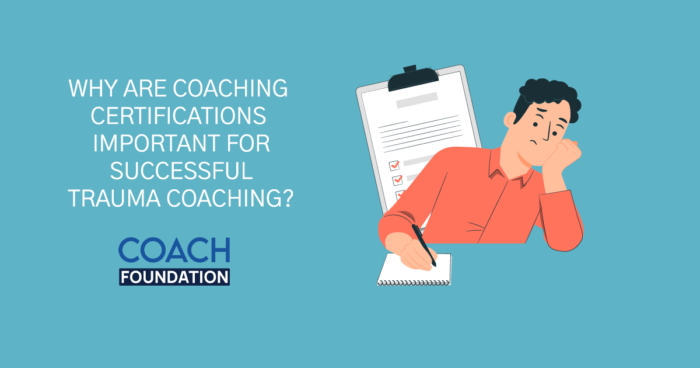Blog » Coaching Certifications » Why are Coaching Certifications Important for Successful Trauma Coaching?
Why are Coaching Certifications Important for Successful Trauma Coaching?
One of the most important things for a successful trauma coaching relationship is having a certified coach. Coaching certifications show that the coach has been professionally trained and is knowledgeable in coaching. It means that they have the skillset to help you work through your trauma and achieve your goals.
Additionally, having a certified coach can give you peace of mind.

You can be self-confident that you are working with someone who understands the complexities of trauma. It can also provide you with the support you need.
If you consider working with a coach to address your trauma, be sure to ask about their certifications and training. It will help ensure that you make the best possible decision for yourself.
- Why are Coaching Certifications Important for Successful Trauma Coaching?
- What is Trauma Coaching?
- Are Coaching Certifications Required for Trauma Coaching?
- 7 Reasons Why Coaching Certifications are Important for Successful Trauma Coaching
- 1. To truly understand how trauma affects individuals
- 2. To understand how you can support them.
- 3. To educate coaches on how they can deal with various trauma.
- 4. To provide credibility to your trauma coaching practices.
- 5. To help you understand the psychology of trauma.
- 6. To help coaches learn how to reframe PTSD.
- 7. To learn how to begin your client’s healing journey.
- Are Trauma Coaching Certifications Expensive?
- Which is the Best Trauma Coaching Certification?
- Conclusion
What is Trauma Coaching?
Trauma coaching is an almost new field that helps people who have experienced a traumatic event. It could be from a natural disaster such as a car accident or sexual assault. Trauma coaches help their clients to process and manage their experiences.
They can provide support and guidance. And help to create a plan for moving forward. Trauma coaching can also be an effective way to deal with the aftermath of a traumatic event. It can also help people to regain control of their lives.
The purpose of trauma coaching is to help people process their experiences and move on with their lives. Trauma coaching can provide a variety of benefits. It including helping people to:
- Understand their experience and why it happened
- Release the emotions they are feeling
- Identify and address any triggers they may have
- Increase their self-confidence and self-esteem
- Develop a support system
- Create a plan for moving forward.
Are Coaching Certifications Required for Trauma Coaching?
No, coaching certifications is not a mandatory requirement for trauma coaching but it can help learn the ropes of this growing field. Be sure to do your research and find a certification program that is right for you.
Trauma coaching is an almost new field that is growing in popularity. It is also a form of counseling that helps people who have experienced a traumatic event heal and move on with their lives. There are no official requirements to be a trauma coach. But there are certification programs available that can provide you with the training you need.
Doing your research is necessary when choosing a certification program. Look for one that is reputable and has a proven track record. The International Coaching Federation (ICF) programs are a good option. They offer an online and in-person certification program that is most respected in the coaching community.
There are many advantages to achieving certification in trauma coaching. It can help you to build your business and expand your client base. It can also help you better understand your clients’ needs and how to best support them.
If you are interested in becoming a trauma coach, doing your research and choosing a reputable certification program is best to get started.
7 Reasons Why Coaching Certifications are Important for Successful Trauma Coaching
There are many reasons why coaching certifications are important. But the main one is that they provide a coach with the tools they need to help their clients support through life’s transitions.
A trauma coach may work with someone who has experienced or seen violence, natural disasters, war, terrorism, the death of a loved one, sexual assault, and more. It can be difficult for someone to go through these experiences alone.
A trauma coach provides support and guidance tailored to individual needs. They also teach skills that will empower them to deal with stress in their lives. And prevent it from impacting their physical and mental health. Seven reasons of coaching certifications are important for successful trauma coaching are as follows:
1. To truly understand how trauma affects individuals
A coach needs to have a firm understanding of how trauma can affect people. They need to recognize the signs and symptoms of post-traumatic stress disorder (PTSD) and other trauma-related disorders.
They should also be aware of the best ways to support clients dealing with these conditions. A certification in trauma coaching will give you the necessary background and knowledge to work with people who have experienced trauma.
2. To understand how you can support them.
Once you have assessed your client’s needs, a certified coach knows how to provide the needed support. Not all trauma survivors respond the same way to support. Some people may need more emotional support, while others enjoy practical advice and guidance.
A certified coach will understand how to best support their clients. They will adapt their approach to meet the individual’s needs. And also referring clients to other professionals as needed.
3. To educate coaches on how they can deal with various trauma.
Certified coaches are not only educated on how to deal with different types of trauma but they are also educated on how to deal with different cultures. Trauma can affect people in different ways depending on their cultural background.
Certified coaches need to be aware of these differences. And to be able to work with clients from all backgrounds. Trauma comes in many different forms. A certified coach will have the education and experience to work with clients who have experienced different types of trauma.
They will also be familiar with the different ways to support clients. Regardless of the type of trauma, they have experienced.
4. To provide credibility to your trauma coaching practices.
The ICF certification is the most honored and well-recognized in the coaching industry. When you have a certification in trauma coaching, it shows that you have met the highest standards in the industry.
It also demonstrates that you are knowledgeable about the best practices for working with trauma survivors. And you are committed to providing the best possible care to your clients. It will also give you the credibility to work with other mental health professionals.
5. To help you understand the psychology of trauma.
The psychology of trauma can be complex. And it cannot be easy to understand how it affects people. The ICF certification will help you to understand the psychology of trauma better. A certification in trauma coaching will also provide you with the education and training that you need to understand how trauma can affect people’s lives.
This knowledge will help you better support your clients and help them heal. It will also give you the tools you need to help your clients recover from their traumatic experiences.
6. To help coaches learn how to reframe PTSD.
Many people who have experienced trauma develop post-traumatic stress disorder (PTSD). One of the main aims of the ICF certification is to help coaches learn how to reframe PTSD. It means that you will help your clients see their traumatic experiences in a new light. And you will also be able to help them move on from the trauma they have experienced.
7. To learn how to begin your client’s healing journey.
The ICF certification will also teach you to begin your client’s healing journey. Trauma coaching is a great opportunity to learn more about how to help your clients recover from their traumatic experiences. The certification will teach you how to assess your client’s needs. And it will also give you the tools you need to help them begin their healing journey.
Are Trauma Coaching Certifications Expensive?
It depends on the program. The cost of certification programs can vary greatly. It also depends on the organization and the level of certification you are seeking. Some programs may be as low as a few hundred dollars, while others may exceed $1000.
When considering the cost of a trauma coaching certification, it is important to weigh the benefits against the investment.
Certification also provides an opportunity to develop your skills and learn from experts in the field. It can also support you build a network of colleagues and peers who can support your work. Finally, whether or not to pursue certification is a personal one. Consider your goals for certification and whether the investment is worth the return.
Which is the Best Trauma Coaching Certification?
The best trauma coaching certification for you depends on your specific needs and goals. The best trauma coaching certification for you depends on your specific needs and goals. If you are looking to become a trauma coach, the International Trauma Coaching Institute (ITCI) certification is a great option.
The ITCI certification is a complete program that covers all aspects of trauma coaching. It provides you with the tools and skills you need to work with clients who have experienced trauma.
When choosing a trauma coaching certification program, there are many factors you need to consider.
First, you need to consider the quality of the program. Make sure the program is approved. And it has a good reputation.
Second, consider the duration of the program. Some programs are shorter than others. If you are looking for quick certification, make sure the program you choose fits your needs.
Third, consider the curriculum of the program. Make sure the program covers the topics you are interested in.
Finally, consider the instructors of the program. Make sure the instructors are qualified. And also have a lot of experience in trauma coaching.
Conclusion
Trauma coaching can be a rewarding and fulfilling way to help many types of people deal with the emotional stress of trauma. Trauma can occur at any point in life. And it can leave its victim deeply scarred. Trauma doesn’t have to occur through a stormy divorce, death, or warfare. But it can be a surely harmless event that causes huge emotional scars.
No matter which type of trauma, you can find effective help in trauma coaching.


ABOUT SAI BLACKBYRN
I’m Sai Blackbyrn, better known as “The Coach’s Mentor.” I help Coaches like you establish their business online. My system is simple: close more clients at higher fees. You can take advantage of technology, and use it as a catalyst to grow your coaching business in a matter of weeks; not months, not years. It’s easier than you think.
AS SEEN ON
0 Comment